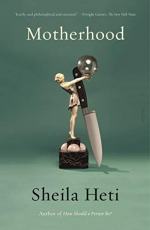|
This section contains 623 words (approx. 2 pages at 400 words per page) |

|
Motherhood: A Novel Summary & Study Guide Description
Motherhood: A Novel Summary & Study Guide includes comprehensive information and analysis to help you understand the book. This study guide contains the following sections:
This detailed literature summary also contains Quotes and a Free Quiz on Motherhood: A Novel by Sheila Heti.
The following version of this book was used to create the guide: Heti, Sheila. Motherhood. Picador, 2019.
Sheila Heti's novel Motherhood is written from the first person point of view of an unnamed narrator. A work of autofiction, the novel straddles the boundaries between the real and the imagined, the philosophical and the fictional. Although the narrative toys with structure and form throughout, the following summary relies upon a linear mode of explanation for the sake of clarity.
When the narrator is 37 years old, she begins to feel pressured to have children. Although she has historically been disinterested in reproducing and starting a family, the expectations of her age, her friends, her culture, and her society weigh on her. Because she feels incapable of making the decision, the narrator decides to consult three coins. She begins to occupy her time sitting at her desk with the coins and asking them questions. After posing each question, she flips the coins. If two or three land heads up, the coins' answer is yes. If two or three land tails up, their answer is no.
Feeling ashamed for her lack of self-confidence and understanding of the world around her, the narrator decides she needs to create something outside of herself. She hopes that whatever she creates might convey her beliefs about the world, and thus about herself. Although she has written several books already, whenever she sits down to write, she feels detached or immobilized. She therefore asks the coins questions about her project. Although the coins give her answers, it is not until her boyfriend Miles suggests she write a book about motherhood that the narrator gains direction and focus.
The narrator and Miles have been together for five years. They live in an apartment in an old house in Toronto. Although the narrator knows that she loves Miles, she often finds herself doubting the sustainability of their relationship. Therefore, when she is in New York City for a series of readings and interviews, she consults a fortune teller about her worries. The fortune teller assures her that Miles loves and will take care of her.
The more often that the narrator consults the coins, the more frustrated that she becomes. At times, the coins help her to alter her outlook. They indeed make her realize that her chief problem is her inability to reconcile her body and her mind. However, at other times, the obvious randomness of the coins' answers upsets the narrator.
While away on her book tour, the narrator travels from country to country and city to city. In each new place, she engages her companions and acquaintances in conversations about motherhood and parenthood. When she returns to Toronto, she feels convinced that she does want children. However, she fears revealing her altered feelings to Miles. Miles has a daughter already, and is disinterested in having more children. The narrator does not want to push him away, and does not want him to see her as ordinary or conventional.
As the narrator approaches her fortieth birthday, more and more of her friends marry, settle down, and have children. Almost all of them are convinced that the narrator will soon have children, too. However, after her friend Libby has a baby, the narrator realizes that although their chosen paths are different, they are equally as valuable and meaningful.
After having sex with Miles one night, the narrator wakes up convinced that she is pregnant. Realizing that she does not want children, she takes a morning-after pill. She reconciles herself with the life that she does have and all that it does hold. She learns to regard her identity and experiences for what they contain rather than for what they lack.
Read more from the Study Guide
|
This section contains 623 words (approx. 2 pages at 400 words per page) |

|



